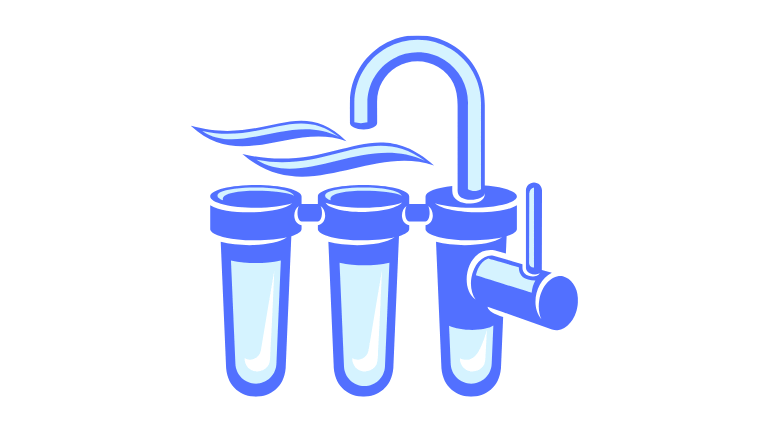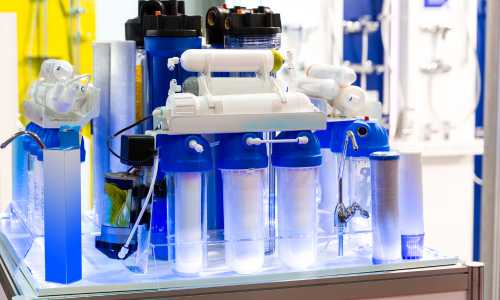In modern households, water quality plays a pivotal role, impacting everything from our health to the longevity of our appliances.
Clean, pure water isn’t just about quenching thirst; it’s about ensuring that every drop we consume or use is free from harmful contaminants and minerals.
As homeowners seek solutions to improve their water quality, a common device comes to the forefront: the water softener. But this leads to a pressing question that many find themselves pondering: Does a water softener filter water?
This article delves deep into this query, exploring the intricacies of water softeners and their role in water treatment
Key Takeaways
- Water softeners remove minerals to combat hard water, improve soap performance, and enhance skin and hair feel.
- Water softeners focus on hardness, while water filters remove a wider range of contaminants.
- Softened water is safe to drink but may have slightly higher sodium levels.
- For comprehensive purification, combining a water softener with a water filter is recommended.
Understanding Water Softeners
A water softener is a specialized device designed to treat what’s commonly referred to as “hard water.” Hard water contains high concentrations of minerals like calcium and magnesium, which can lead to various household issues, from soap scum to reduced appliance efficiency.
The primary function of a water softener is to:
Remove or neutralize these minerals through a process called ion exchange.
The primary goal of softening water is to:
- Prevent mineral buildup in plumbing and appliances.
- Enhance the effectiveness of soaps and detergents by eliminating mineral interference.
- Provide water that feels smoother on the skin and hair.
Water Softener vs. Water Filter
While both water softeners and water filters aim to improve water quality, they serve distinct purposes and function differently.

Key differences between the two:
Functionality
Water Softeners primarily address the hardness of water by removing or neutralizing minerals like calcium and magnesium.
Water Filters, on the other hand, are designed to remove a broader range of contaminants, including chlorine, sediment, and certain microbes.
Mechanism
Softeners typically use an ion exchange process, replacing hard minerals with sodium or potassium ions.
Filters employ various methods, such as activated carbon or reverse osmosis, to trap and eliminate contaminants.
The specific roles each plays in water treatment
Water Softeners: Their main role is to combat the challenges of hard water, preventing scale buildup in pipes and appliances, and enhancing the lathering ability of soaps.
Water Filters: They ensure the water is free from a wide range of contaminants, making it safer for consumption and use.
The Science Behind Water Softening
The realm of water softening is deeply rooted in science, ensuring that households receive water free from the challenges posed by hard minerals. Here’s a closer look at the mechanics:
How do water softeners work?
At the heart of a water softener is a bed of resin beads. These beads are charged with sodium or potassium ions.
As hard water flows through the softener, the resin beads attract and capture the calcium and magnesium ions, releasing their sodium or potassium ions in exchange.
The process of ion exchange
Ion exchange is the fundamental principle behind water softening. It’s a reversible chemical reaction wherein ions from an insoluble solid (the resin beads) are exchanged for ions in a surrounding solution (the water).
The result is “softened” water, where hard minerals have been effectively replaced by sodium or potassium ions.
Benefits of Using a Water Softener
Investing in a water softener offers a myriad of benefits that go beyond just addressing hard water. Here’s a closer look at the advantages:
Prevention of mineral build-up
Hard water can lead to scale deposits in pipes, faucets, and appliances. Over time, this buildup can clog plumbing and reduce water flow. A water softener effectively prevents such mineral accumulation, ensuring smooth water flow and reducing maintenance costs.
Enhanced appliance lifespan
Appliances like dishwashers, washing machines, and water heaters operate more efficiently with softened water. The absence of scale buildup means less wear and tear, leading to a longer lifespan and fewer repairs.
Improved water quality for specific uses
Softened water enhances the lathering ability of soaps and detergents, leading to cleaner laundry and dishes. Additionally, it feels smoother on the skin and hair, making showers more refreshing and reducing the need for excessive hair and skin products.
Limitations of Water Softeners
While water softeners are excellent tools for addressing hard water, they come with certain limitations:
What water softeners don’t remove
Softeners primarily target calcium and magnesium ions. They do not effectively remove other contaminants like chlorine, pesticides, bacteria, or certain heavy metals present in the water.
The need for additional filtration for certain contaminants
To ensure comprehensive water purification, homeowners might need to pair their water softener with a water filter. This combination ensures both hardness and other contaminants are addressed, providing truly clean and safe water for household use.
Water Softeners and Health
The relationship between water softeners and health is a topic of interest for many homeowners. Let’s delve into the facts:
The impact of softened water on health
Generally, softened water is safe for consumption. However, it contains higher sodium levels due to the ion exchange process. For those on sodium-restricted diets, it’s essential to be aware of this increase, though it’s typically minimal.
Addressing common health-related myths
A prevalent myth is that softened water can lead to cardiovascular issues due to increased sodium. In reality, the sodium increase is minor and unlikely to pose health risks for the average individual.
| Health Aspect | Potential Impact of Water Softeners |
|---|---|
| Cardiovascular Health | Reduction in cardiovascular risks due to lower sodium intake |
| Skin and Hair | Softer water may lead to healthier skin and hair |
| Drinking Water Quality | Reduced mineral content in drinking water can be beneficial |
| Sodium Intake | Increased sodium levels in softened water can be a concern |
| Environmental Impact | Disposal of brine and regeneration chemicals can harm nature |
| Appliance Longevity | Prolongs the lifespan of water-using appliances |
| Soap and Detergent | Reduced soap and detergent usage due to improved lathering |
Expert Opinions on Water Softeners
When considering a water treatment solution, the insights of experts in the field can provide invaluable guidance. Here’s what the professionals have to say about water softeners:
Insights from water quality experts:
Many water quality professionals commend the effectiveness of water softeners in addressing hard water issues. They highlight the benefits of preventing scale buildup, which can lead to reduced energy consumption and extended appliance life.
However, some experts also emphasize the importance of understanding the source water’s composition to choose the most suitable water treatment solution.
Recommendations for households
Experts often recommend a combined approach for comprehensive water treatment. While a water softener addresses hardness, pairing it with a filtration system can tackle a broader range of contaminants.
For households in areas with exceptionally hard water, a water softener is deemed almost essential to prevent plumbing issues and enhance water quality.
Making an Informed Decision
Choosing the right water treatment solution requires careful consideration and understanding:
Factors to consider when choosing a water treatment solution:
Water Source: The quality and composition of your source water play a crucial role in determining the right solution.
Household Usage: The amount of water consumed and used daily can influence the type and size of the system needed.
The importance of understanding individual household needs
Every household is unique. Factors like family size, water consumption habits, and specific water-related concerns should guide the decision-making process. Tailoring the water treatment solution to individual household needs ensures optimal results and long-term satisfaction.
Frequently Asked Questions
The world of water softeners often brings up numerous questions. Here are some frequently asked ones, along with their answers:
Does a water softener remove chlorine?
No, standard water softeners are designed primarily to address water hardness by removing calcium and magnesium ions. They do not effectively remove chlorine. For chlorine removal, a separate filtration system, such as an activated carbon filter, would be required.
Can water softeners introduce salt into drinking water?
Yes, water softeners that use salt for the ion exchange process introduce a small amount of sodium into the water. However, the amount is typically minimal and not a significant concern for most individuals. Those on sodium-restricted diets should be aware of this addition.
Are there salt-free water softeners?
Yes, there are salt-free water softeners available. These systems condition the water by altering the structure of the minerals, preventing them from forming scale. They don’t “soften” the water in the traditional sense but are effective in preventing scale buildup without introducing sodium.

Mark is a seasoned Outdoor Equipment and Heating Appliances specialist. With a passion for adventure and a keen understanding of heating solutions, he brings expertise to the world of outdoor enthusiasts. Mark’s insights, gained through years of experience, make him a go-to resource for those seeking reliable guidance in navigating the realm of outdoor gear and heating technologies.

